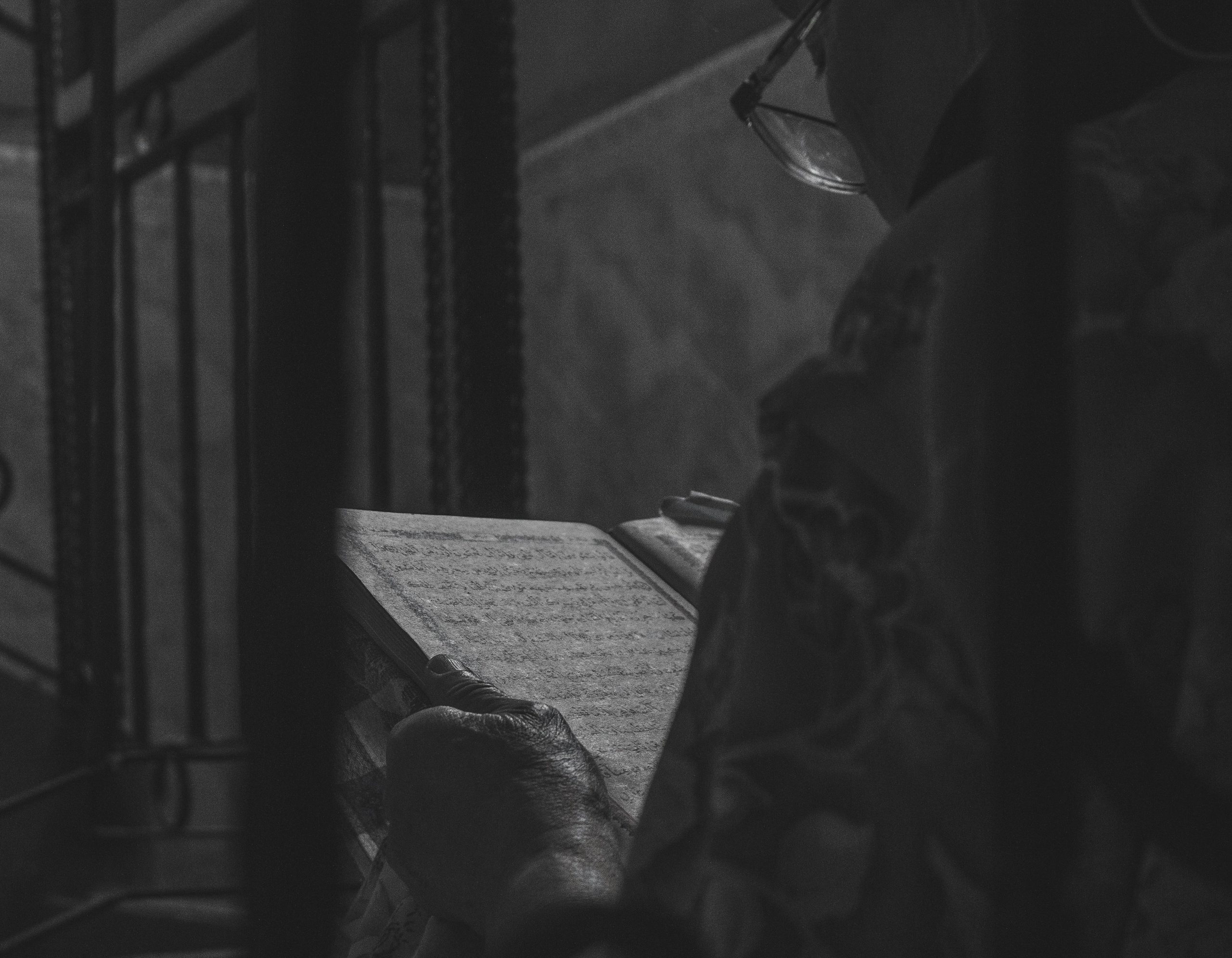#Islam
Be Among The Awliyah of Allah: Steps To Attaining The Loftiest Status
Published

What is a Walī of Allah  ?
?
The greatest identifier of an Islamic role model is their devotion to their Lord. Many of our righteous predecessors who have excelled in this element have been labeled with the illustrious title “Walī of Allah”. This phrase, often translated as “the friend of Allah”, more accurately means “the one who is close to Allah”. Nearness to our Lord, in this life and the next, is the loftiest status we can aim for. But who is this person? How does one achieve this status? Is it possible for us, as 21st century Muslims, to reach the same height?
The answer, as we might expect, lies in the Qurān, where Allah 
Keep supporting MuslimMatters for the sake of Allah
Alhamdulillah, we're at over 850 supporters. Help us get to 900 supporters this month. All it takes is a small gift from a reader like you to keep us going, for just $2 / month.
The Prophet (SAW) has taught us the best of deeds are those that done consistently, even if they are small. Click here to support MuslimMatters with a monthly donation of $2 per month. Set it and collect blessings from Allah (swt) for the khayr you're supporting without thinking about it.
“Unquestionably, [for] the allies of Allah there will be no fear concerning them, nor will they grieve.
Those who believed and were fearing Allah.” [Surah Yunus: 10;62-63]
These people, these mortals with a special relationship with their Creator, are characterized in the Quran by two qualities: īmān, or belief, and taqwā, or fear/god-consciousness. They are those with unshakeable faith, for whom the flame of Islam is a blazing furnace in their chest. They are, simultaneously, those for whom thoughts of the fires of Hell are a constant source of trepidation. These dual qualities of īmān and taqwā form the foundation of our religion: enjoining good and forbidding evil. Every Muslim has these qualities, but what sets apart the awliyā’ of Allah 
Shaykh al-Islām Ibn Taymiyah describes this status in his book ‘Al-Furqan Bayna Awliyā’ Al-Rahmān wa Awliyā’ Al-Shayṭān’, or ‘The Differences Between the Awliyā’ of the Most Merciful and the Awliyā’ of the Devil’. In it, he describes walāyah of Allah 

Thus, a person of excellent īmān is one who will always go the extra mile in goodness, never letting an opportunity for hasanāt pass them by because they know it involves actions loved by Allah 
Strategies for Increasing Īmān

Īmān begins with intentionality. Why do we do good? Why do we sacrifice our money, time, and energy on virtuous deeds? The answers to these questions lie within the innate human sense of morality, the fiṭrah, of which the ultimate source is Allah 

To better understand this mindset, imagine the relationships we have with our parents. Why do we serve and obey them? Is it because of some social contract, or some sense of self-interest? No. We serve our parents because we love them, and that which brings them pleasure also brings us pleasure. A proud face from our father or a word of love from our mother instantly brightens our day. Now, project that same relationship onto Allah 
Centering our lives around the pleasure of Allah 
He is an amalgamation of every positive quality in this world and more. When approaching Allah 
A practical strategy for enhancing our relationship with Allah 



As we strive to build a relationship with our Lord, we should also act to increase our love of His Messenger 
“Say, [O Muhammad], “If you should love Allah, then follow me, [so] Allah will love you and forgive you your sins. And Allah is Forgiving and Merciful.” [Surah Al-Imran: 3;31]

Aiming for closeness to Allah [PC: Imad Alassiry (unsplash)
 tells us that a sign of love for Him is following the examples set by His Messenger
tells us that a sign of love for Him is following the examples set by His Messenger  . Ibn Taymiyah expands, in his same text mentioned earlier, saying, “In this verse, Allah explains that whoever follows the Messenger, Allah
. Ibn Taymiyah expands, in his same text mentioned earlier, saying, “In this verse, Allah explains that whoever follows the Messenger, Allah  will love him, and whoever claims that Allah loves him but does not follow the Messenger
will love him, and whoever claims that Allah loves him but does not follow the Messenger  is not one of the close friends (awliya’) of Allah.” This explanation is clear: closeness to the Lord also must mean closeness to the Messenger. This can be exemplified by integrating sunnah actions into our daily routine, by sending salawāt upon him constantly, and by asking Allah
is not one of the close friends (awliya’) of Allah.” This explanation is clear: closeness to the Lord also must mean closeness to the Messenger. This can be exemplified by integrating sunnah actions into our daily routine, by sending salawāt upon him constantly, and by asking Allah  to grant us nearness to him in the next life.
to grant us nearness to him in the next life.
Other actions to boost īmān revolve around other common religious rituals. It is important to note that we should prioritize mandatory actions over optional worship. There is no point spending half the night in taḥajjud if it causes us to sleep through Fajr the next day. If we notice gaps in our prayer, our charity, our fasting, those should be rectified first.
Once we are steady in our obligations, there are a variety of optional actions that, taken together, can elevate our īmān in our pursuit of becoming awliyā of Allah 


Among the greatest senses of intimacy one can obtain with Allah 

“And those who spend [part of] the night to their Lord prostrating and standing [in prayer].” [Surah Al-Furqan: 25;64]
As we take steps to increase our īmān, we will find the path of closeness to our Lord naturally opening to us. As Allah 
Strategies for Increasing Taqwā
While īmān is being mindful of the actions, words and deeds that come out of us, taqwā is being mindful of all that goes in. Strengthening our taqwā means ensuring everything surrounding and entering us is good. Our food is pure and halal. Our wealth is from allowed sources. Our clothing protects our chastity and is appropriate for our gender. That which we see, that which we hear, is only pleasing to Allah 
As Muslims living in the West, we endure a living situation which can only be described as an assault on taqwā. To step out of our homes is to expose ourselves to unclothed bodies, foul speech, rampant music, and worse. It is imperative, then, that we strive to limit our exposure to these things. The walī of Allah 

Deeping understanding of Islam and the Quran [PC: Mohammed Idris Djoudi (unsplash)]
 Awliyā: all of their actions, no matter how benign they seem, are done in the name of Lord. Something as simple as eating a meal can become a source of hasanāt if we intend to use the energy gained in the way of Allah
Awliyā: all of their actions, no matter how benign they seem, are done in the name of Lord. Something as simple as eating a meal can become a source of hasanāt if we intend to use the energy gained in the way of Allah  . Daily tasks such as attending school or working a job can become a means of enhancing our relationships with Allah
. Daily tasks such as attending school or working a job can become a means of enhancing our relationships with Allah  if we mean to use the resources gained to advance our Muslim communities. Setting pure intentions prior to each of our actions protects us from falling into that which is impermissible while centering every element of our daily lives around Allah
if we mean to use the resources gained to advance our Muslim communities. Setting pure intentions prior to each of our actions protects us from falling into that which is impermissible while centering every element of our daily lives around Allah  .
.
In the verses of Surah Yunus mentioned earlier, Allah 


Conclusion
Some statuses in Islam have clear requirements to join their ranks. To be named among the saḥābah, a believer must have met the Prophet . Achieving the rank of shaheed means dying with specific circumstances or for a particular purpose. In contrast, there is no clear distinction outlining the awliyā of Allah 

Related:
The Fluctuating Heart : Identifying And Managing Dips In Imaan
Keep supporting MuslimMatters for the sake of Allah
Alhamdulillah, we're at over 850 supporters. Help us get to 900 supporters this month. All it takes is a small gift from a reader like you to keep us going, for just $2 / month.
The Prophet (SAW) has taught us the best of deeds are those that done consistently, even if they are small. Click here to support MuslimMatters with a monthly donation of $2 per month. Set it and collect blessings from Allah (swt) for the khayr you're supporting without thinking about it.
Haaris Jilani is a recent graduate of Georgia Tech and is currently pursuing a Master's in Bioengineering at Imperial College London. He is passionate about weaving together religion and science, and has been named a Marshall Scholar and United Nations Millennium Fellow for his dual work in stem cell research and educational accessibility.


[Podcast] Guardians of the Tradition: Muslim Women & Islamic Education | Anse Tamara Gray

Digital Intimacy: AI Companionship And The Erosion Of Authentic Suhba

Starting Shaban, Train Yourself To Head Into Ramadan Without Malice

Far Away [Part 7] – Divine Wisdom

How to Make this Ramadan Epic | Shaykh Muhammad Alshareef

Op-Ed: From Pakistan To Gaza – Why Senator Mushtaq Ahmad Khan Terrifies Power And Zionism

[Podcast] Should Muslims Ally with Conservatives or Progressives? | Imam Dawud Walid

The Muslim Book Awards 2025 Winners

Keeping The Faith After Loss: How To Save A Grieving Heart

The Sandwich Carers: Navigating The Islamic Obligation Of Eldercare

[Podcast] Guardians of the Tradition: Muslim Women & Islamic Education | Anse Tamara Gray

How to Make this Ramadan Epic | Shaykh Muhammad Alshareef

[Dhul Hijjah Series] Calling Upon the Divine: The Art of Du’a (Part 1)

IOK Ramadan 2025: Four Steps | Sh Zaid Khan

IOK Ramadan 2025: Do Your Best | Sh Zaid Khan
MuslimMatters NewsLetter in Your Inbox
Sign up below to get started
Trending
-
#Life1 month ago
Faith and Algorithms: From an Ethical Framework for Islamic AI to Practical Application
-
#Current Affairs1 month ago
An Iqbalian Critique Of Muslim Politics Of Power: What Allamah Muhammad Iqbal’s Writings Teach Us About Political Change
-
#Current Affairs1 month ago
Quebec Introduces Bill To Ban Prayer Rooms On College Campuses
-
#Culture1 month ago
MM Wrapped – Our Readers’ Choice Most Popular Articles From 2025














